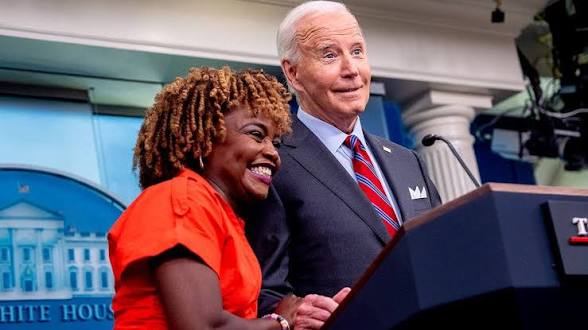Karine Jean-Pierre’s memoir and book tour have pulled her back into the news cycle she once managed. For three years she was the public face of the Biden White House—its gatekeeper, explainer, and at times its deflector. Now she’s telling her version of that period in Independent, insisting that she served an “engaged and decisive” president and that her critics never understood what the job demanded.
The record is more complicated.
The Shield
During 2024’s roughest months, reporters repeatedly asked whether President Biden was showing signs of fatigue or confusion. At the podium Jean-Pierre brushed off the questions as “disrespectful” or “not based in reality,” directing journalists back to the president’s “record of accomplishment.”
Those exchanges are on tape, and they stand in contrast to what followed—the televised debate that accelerated Democratic panic and Biden’s eventual withdrawal.
Even on her current tour she tells interviewers the president was “always sharp” and that party elders “betrayed” him. The pattern is clear: a spokesperson who treated legitimate scrutiny as attack, and who still defends the illusion long after it collapsed.
The Brand
Jean-Pierre’s tenure also redefined the job’s boundaries. She was the first Black, female, openly gay immigrant to hold the position—historic firsts that deserved acknowledgment. But the celebration often became the message.
A Vogue spread, talk-show appearances, and a carefully managed social-media presence turned her into a stand-alone personality. Colleagues told Axios she was “more interested in promoting herself than Joe Biden.”
The book’s framing—part memoir, part manifesto—cements that impression. Representation became résumé; visibility replaced effectiveness. The White House podium, meant to project the administration’s voice, instead became her personal microphone.
The Mirror
Since leaving, Jean-Pierre has criticized her successor, Karoline Leavitt, for “demeaning the office” and turning press briefings into online theater. The rebuke might carry more weight if Jean-Pierre’s own record weren’t dotted with complaints about message control and restricted access. Reporters remember off-camera briefings, rehearsed talking points, and a running tally of “we’ll circle back.”
She isn’t wrong that civility matters; she’s simply not the ideal messenger. What she describes as decorum looks, in hindsight, like projection.
Why It Matters
Press secretaries come and go, but the line between communication and self-promotion keeps getting thinner. Jean-Pierre’s story is a study in how representation, image, and loyalty can blur into one performance. The White House podium is supposed to clarify; hers became a mirror—and now a marketing plan.
The question her book never answers is the one her briefings always dodged: was she speaking for a president, a party, or herself?
Citations
- Axios – “Biden aides furious over Karine Jean-Pierre’s book rollout” (Jun 5 2025)
- BBC News – “Karine Jean-Pierre leaves Democrats, launches memoir” (Jun 2025)
- Reuters – “Fact-check: No evidence Jean-Pierre called Rafah strike a ‘massacre’” (May 31 2024)
- EW – “Jean-Pierre and Kelly O’Donnell scold reporter over Biden joke” (Jul 25 2024)
- The Guardian – “Karine Jean-Pierre defends Biden, blames party elders for chaos” (Oct 19 2025)
- Fox News – “Jean-Pierre calls successor’s conduct ‘deplorable’ after briefing spat” (Oct 2025)

